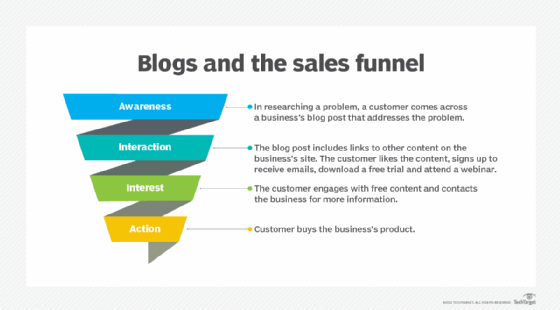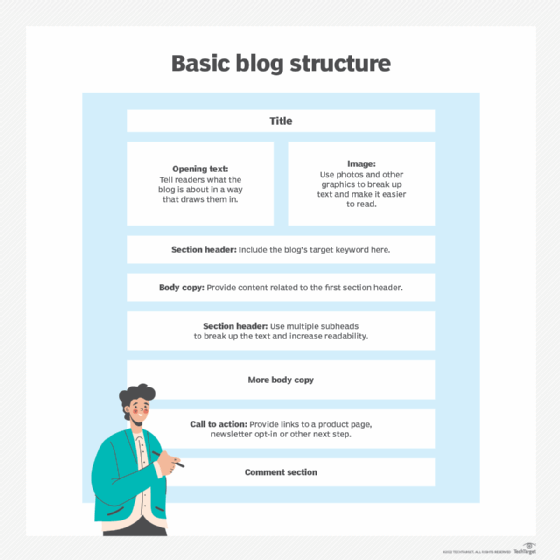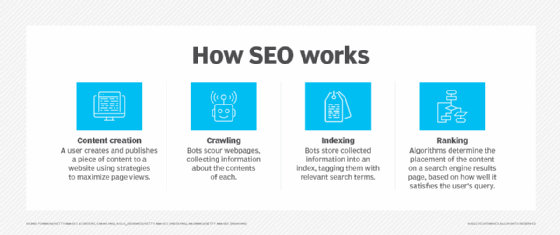weblog
What is a blog?
A blog, short for weblog, is a frequently updated web page used for personal commentary or business content. Blogs are often interactive and include sections at the bottom of individual blog posts where readers can leave comments.
Most are written in a conversational style to reflect the voice and personal views of the blogger. Some businesses use blogs to connect with target audiences and sell products.
Blogs were originally called weblogs, which were websites that consisted of a series of entries arranged in reverse chronological order, so the newest posts appeared at the top. They were frequently updated with new information about various topics.
Today's blogs are more likely to be a personal online journal or commentary related to a business that's frequently updated and intended for general public consumption. Blogs are still often defined by their format, consisting of a series of entries posted to a single page in reverse chronological order. Many blogs are collaborative and include multiple authors often writing on a single theme such as Engadget, a tech blog with multiple authors.
A blog is usually devoted to a subject of interest to a target audience -- such as fashion, politics or information technology. Blogs can be thought of as providing ongoing commentary on a theme. They're intended to engage with a community interested in a topic and the personality or products of the blogger or sponsoring business. Bloggers often pick unique domain names that reflect the topic at hand, such as Not Another Cooking Show, a food blog.
Bloggers control their content and don't have to rely on other outlets to publish their views and connect with an audience. Monetization strategies let bloggers make money from their writing and sometimes build entire careers.

What is a blog used for?
The first blog sites were essentially online personal diaries or journals. They became popular for their regular content updates, personal point of view, aggregation of interesting links, and the opportunity to engage in the comments section with the blogger and their audience.
Blogs have come a long way from their early days as online journals, though it's still a popular reason people create a blog. They've also become an important way for buyers to gather information about the products and services they're researching.
According to Gartner, most customers do much of their buying research online, spending only 5% of their time with sales reps. Responding to that trend, blogging has become an effective way for organizations to create authoritative content attractive to buyers conducting their own research. Most business blogs end by advertising their product in hopes readers are ready to buy after reading and learning from the blog.

Some other reasons people start blogs include the following:
- Share views and connect with an audience. Blogs provide many writers and thought leaders with an outlet to share information and their views with a wide audience. Instead of relying on publications to publish their content or write about their business, individuals and businesses communicate directly with their audience. Blogging is an effective way to raise awareness about a subject or product and to build an online community around it.
- Build a business and sell products. Blogging is a popular practice for businesses trying to gain credibility in their industries, build high search engine rankings, connect with a target audience and identify sales leads. Using search engine optimization (SEO) strategies, blog content can turn a business blog into an authority on a technology or market. In this way, a business can reach a wide audience that regularly visits or links to its website and buys its products.
- Raise awareness. Blogs are an effective way to raise awareness about issues and causes, and to influence public and government opinion. Many nonprofit organizations use blogs to build social and political campaigns that inform audiences about a topic and keep them engaged in that topic's development.

What is a blog post?
A blog post is the piece of content in a blog. Posts are frequently updated and often organized in reverse chronological order with the newest blog post appearing at the top.
Each post covers a subtopic of the blog and links back to the blog itself. For instance, blog site Engadget focuses primarily on technology news and reviews of consumer electronics. Each blog post covers a specific piece of electronic or technology news. But posts on the site also cover topics adjacent to electronics, such as movies and other forms of entertainment that overlap with the tech space. For example, one post looks at a movie dramatization of the popular video game chain GameStop.
Bloggers use their posts to attract audiences and rank high on search engine results. Business blog posts are often used at the beginning of the sales funnel that describes a product buyer's journey. They serve as an audience's introduction to a business and its products. Bloggers can use these posts to build content around more keywords and topical trends that audiences are searching for and turn those visitors into customers.

What's an example of a blog?
Computer Weekly Editors Blog is an example of a tech blog that follows the basic blogging format. The homepage is in reverse chronological order, with the most recent posts at the top. The blog is updated with new blog posts on a regular basis.
This blog is typical of blogs that are extensions of organizations. It includes a side menu that lists all the blogs Computer Weekly offers, as well as a menu at the top that links back to Computer Weekly's nonblog content.
What is a blogger?
A blogger is a person or business that blogs. Anyone can be a blogger, such as experts in certain fields, laymen who simply like to write, writers trying to build careers and businesses wanting to attract an audience and become thought leaders in their industry.
Some bloggers are independent operators, while others are hired by companies as contractors or full-time employees. These bloggers often work in marketing or customer service departments and create marketing-driven content about their company's industry and products.
The history of blogs
The first blog, Links.net, was created in 1994 by Swathmore College student Justin Hall and is still active. However, the term weblog was not coined until 1997 when blogger Jorn Barger used it to refer to the bloggers' mission of "logging the web."
In 1999, programmer Peter Merholz created the term blog by breaking the phrase weblog into we blog in the sidebar of his personal blog. Later that year, the blogging service Blogger was released, which was the first online blog tool to officially use the term blog instead of weblog.
Since then, other types of blogs have arisen, such as vlog -- short for video log -- which is a video-based method of blogging. Live blog was coined to describe a series of live takes about events as they happen, such as a sports game or political debate. Both terms have fallen out of use after these blog forms became subsumed in the capabilities of social media platforms such as Facebook, Twitter and Instagram.
How do bloggers get paid?
Many early blogs syndicated their content to subscribers using RSS feeds. RSS is a popular type of content distribution tool that's good at generating awareness, but it doesn't provide direct revenue. Bloggers have found other ways to share their work and generate revenue.
Here are five ways bloggers can make money:
- Salaried or contracted position. Companies hire bloggers as full-time employees and freelance contractors. In these positions, they often work as part of content marketing or public relations departments and create content about the organization's products or services.
- Placing ads on a blog is one of the simplest ways to make money. Like any other website owner, bloggers can sign up for ad networks to place ads on their site or use programmatic advertising. The blogger is paid by impressions, which is every time a visitor views the ad. They also get paid every time a viewer clicks on the ad. In cases of successful blogs like HuffPost, ad networks reach out directly to bloggers with a request to run ads.
- Affiliate marketing. Bloggers partner with companies that pay them to promote their products. Often, a company will give the blogger a unique URL to the company's product web page that, when a visitor clicks and makes a purchase through it, pays the blogger a commission.
- Sponsored posts. Companies pay bloggers to create content about their brand or product. A blog must have a large enough target audience so that the promotion reaches many viewers. Bloggers also reach out directly to businesses that offer products they'd like to sponsor.
- Selling products, services and subscriptions. Many bloggers are businesses or business-minded people who sell digital or physical products. Blogs are a great way to attract an audience to a blogger's products. Bloggers who have established authority as experts or thought leaders in their field often offer personal services and exclusive content to their audience. Bloggers can become coaches and consultants, and offer courses, memberships and subscriptions in which the audience pays them directly for expert counsel or exclusive content. For example, a blogger who writes about finance may offer services to become a customer's financial coach or offer expert advice hidden behind a paywall.
Blog vs. website: What's the difference?
Blogs generally update regularly and offer engagement via the comments section. Websites often offer static information about a person, business or topic and don't always change frequently.
However, the terms aren't mutually exclusive. A blog can be a section of a website. For instance, a business blog is often the subsection of a business website that engages with an audience and updates frequently with new content about products and the industry.
On the other hand, blogs often are the website itself. This is especially true of personal blogs that don't offer services or products. In this case, there's limited content other than the blog. The only page that may exist outside of blog posts are contact pages.
Blog vs. wiki: What is the difference?
Blogs and wikis share some similarities, but they differ in several ways.
Wiki
A wiki is a server program that lets multiple people collaborate to create and update website content. They tend to have the following characteristics:
- focus on relaying and updating facts;
- format is topical rather than chronological;
- use anonymous writers and editors; and
- don't include comment sections.
Blog
Blogs are websites or parts of websites. They can be collaborative, and usually take the following approaches:
- voice and personality driven;
- arranged chronologically;
- can be anonymous, but often are not; and
- include a comment or other section to interact with readers.
How to start a blog
There are four steps to follow when creating a successful blog:
- Pick a blogging and hosting service. There are many platforms -- such as Blogger, Medium, Squarespace, Tumblr and WordPress -- that help users build and design blogs and also provide templates to follow. Some services also offer web hosting, where they store the site on a server with a unique address.
- Choose a target audience and subject. A defined audience and devoted subject matter make attracting visitors easier. This approach offers more opportunities to use targeted keywords that rank high on search engines. A targeted audience is also important in terms of building a personality and unique voice for the blog.
- Update regularly with SEO in mind. Blogs generate the most traffic when they're updated frequently and use effective SEO strategies. SEO helps blog owners pick keywords and strategies that get their blog to rank high in search engine results, making it more likely visitors will find their page. There are many free SEO tools bloggers can use to get started.
- Some monetization, such as ad placements and offering products and services, can begin at the early stages of a blog. Even if a blog has just been started, monetization can generate earnings for page views or small-scale product purchases.

The future of blogs
Blogging has seen many of its once-defining features subsumed by other web services and applications. The ability to interact with an audience through comments, live updates and a vlog are now ubiquitous features on YouTube, Facebook, Instagram, Twitter and other social media sites.
The growth of podcasts has also replaced the prevalence of vlogs. Services like Substack let writers get paid for content through subscriptions and attracts writers away from the blogging model.
However, blogging remains a popular activity even after almost 30 years. Tumblr, one of the most popular blogging sites, hosts more than 550 million blogs. Blogging is also a lucrative career choice, with blogs such as HuffPost, Mashable and Gizmodo enjoying success as popular websites.
And for a business that sells products, blogs remain one of the most effective ways to generate web traffic, build authority in their field and attract customers. Most modern businesses continue to seek competitive advantages through their blog posts.
Blogs are an effective way of building leads and customers for businesses. Learn 8 reasons why blogs are important for businesses.
